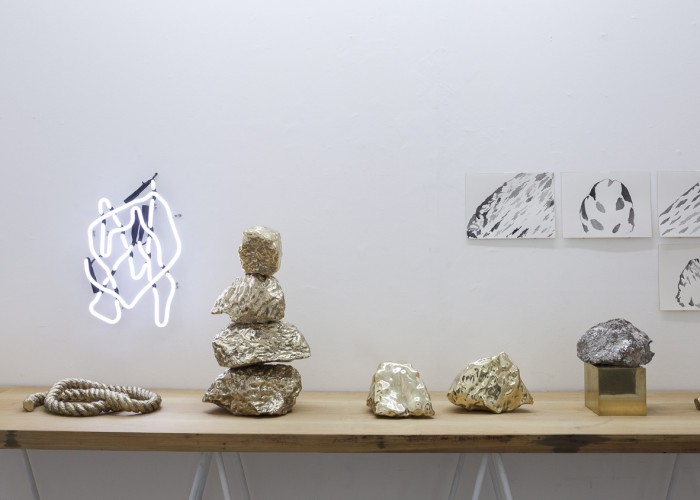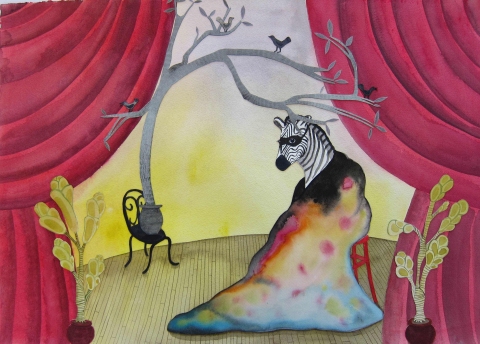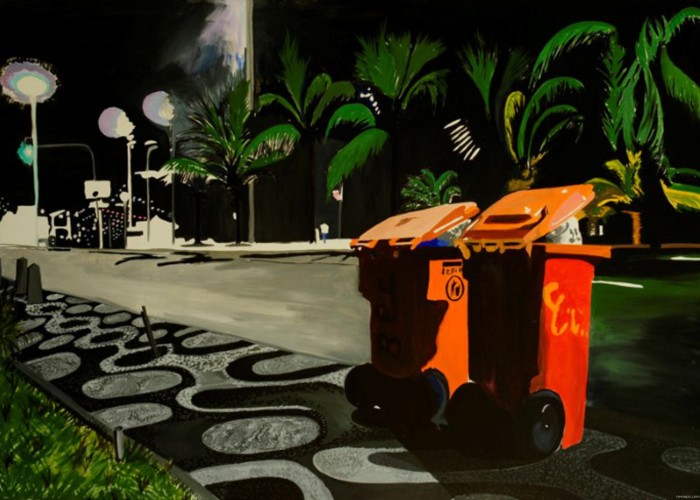Alfredito
Liliana Colanzi
translated by Chris Meade
Once, when I was a little girl, I saw a pig being killed. It was summer. Flies were launching themselves against the windows. I used to like to chew ice, and in the afternoon I would go up to the balcony with a glass brimming with little cubes to watch the neighbor, Mr. Casiano, breaking down old furniture with a handsaw on his patio. But not that day. I had just positioned myself against the bannister when a shriek struck me head-on. Mr. Casiano was crushing the creature with hammer blows. The pig howled—or grunted? or roared?—and ran for its life, half its face destroyed, but it was tethered by the neck to a starfruit tree and the rope only allowed it to run in frantic, ever-shortening circles around the tree. Mr. Casiano paused from time to time to wipe away sweat with his shirtsleeve and take another drag from the cigarette hanging between his lips. He only needed to wait for the pig to run past him again in order to strike it with another hammer blow on the back or head, and then the pig was stumbling and falling over its legs, it would get itself back up moaning and scratching at the ground. According to my nana Elsa, who knows about these things, it must have been at this moment that the fear got into me, the ñaña, the bad thing, because ever since I’ve become an anxious creature, a cry-baby, easily shocked. They say that a gift sometimes comes with the fear: clairvoyance, for example, seeing without being seen. But all of that was already there. What’s there returns, my nana would say. But I believe it all began with Alfredito’s death.
My nana Elsa was the granddaughter of an Ayoreo Indian woman. My grandmother had been tasked with bringing Elsa down from the mountain when she was very young, but years living in the city hadn’t been able to take the mountain out of my nana. One of the customs she had inherited from her nomadic forbears was a taste for chewing the lice she pulled off my head each time I was a victim of a new outbreak at school. What a stud! she would shout, overcome with delight each time she found an alpha male in my hair, and her strong agile fingers would seize the intruder to place it between her teeth, where it burst from one motion of her jaw. My mother abhorred these things.
On exactly the day that I found out about Alfredito’s death, my nana Elsa was cleaning lice from my hair and I was shouting my complaints. Mom appeared in the kitchen door following the sound of her heels.
Elsa is hurting me! I shrieked, hoping that Mom would tell her off, but she didn’t pay me any attention. She had her eyes fixed on the floor, like she was ashamed of something.
Alfredito died, mom said, and only then did Elsa’s thick hands let go of my hair. I laughed, dazed, because it was the first time someone had brought me the news of a death, and because the name couldn’t be misunderstood.
Alfredito Parada Chávez? I asked, as if there were another.
Alfredito was the smallest kid in class. The music teacher loved him because he played the piano marvelously; in all the other subjects, he was on the verge of failing. The week before, when the Cow, the language teacher, called attendance with her scratchy voice (“Parada Chávez, Alfredo”), Alfredito had answered, “Present and erect, miss.” I didn’t understand the joke, but they sent Alfredito—again!—to the principal’s office to talk with Brother Vicente. Alfredito must have known that office like the back of his hand.
He had an asthma attack last night, Mom said. They say he was playing in the yard until late, in all that rain, and he went to bed wet. No one in the house realized. Tita found him in the morning, gasping for air. Purple. When they brought him to the clinic, he had already stopped breathing. He died this morning.
I broke out in tears. Elsa hugged me.
The vigil is at seven, said Mom. And then to Elsa: Wash her and change her, I’m going to come and pick her up at a quarter till seven. If Cuculis calls, tell her I went to Michiko.
Cuculis was my aunt; Michiko, the Japanese hairdresser. Elsa went up to my room with me.
Oh, Lord, what a wrong you’ve done, she sighed. Just a little boy.
I had already forgotten that I was crying, and my imagination was struggling to comprehend the enormity of what had happened. Where could Alfredito be? In heaven or hell, or maybe his spirit was wandering the world? Did Brother Vicente know? And the Cow? Elsa started the shower: gusts of steam escaped over the curtain. I undressed and threw my clothes on the floor. As soon as I found myself naked, a sudden fear made me rush to cover myself with a towel. Now that he had died, was it possible that Alfredito could squeeze into my room and watch me? Ghosts don’t have secrets, and I didn’t want Alfredito—who’d had the habit of spying on the intermediate-level girls in the school dressing rooms—to see me butt naked, even if he were a good ghost.
What the . . . ? said Elsa.
Nothing, I responded, because it was all very difficult to explain suddenly, and tossing off the towel stepped under the falling water.
Somewhere, at the same moment, Alfredito’s corpse—too small even for a ten-year-old: a blessed miniature from the Alasitas festival—began to decompose, to feed worms. Just a month before, during a trip we fifth graders made to Samaipata, Alfredito had taken out of his backpack a bottle of strawberry liquor that he’d stolen in town. We drank it in secret gulps while the wind howled in the mountains. The keeper of the ruins wore a ski mask and showed us where the Incas made human sacrifices. The victims’ souls were still haunting the stones. Some nights, spaceships touch down here, said the keeper, indicating the metallic blue sky. The Cow suggested that only ignorant, vulgar people believed in such things. The liquor had given us red stains around our mouths, but we didn’t feel any of the promised effects. Spin around, ordered Alfredito when we got down to the plain, where there was a skeleton and a small abandoned plane, and we started spinning amidst the swirling winds. Then the strawberry liquor set something off in my brain, it swelled my chest and my throat, and the sky opened itself suddenly in a giant spiral. I was laughing. We were all laughing. You see this, assholes? said Alfredito, running like mad against the wind with his arms open. Of course we saw. That night, enlivened by the liquor, Yeni approached my bed and, taking advantage of the fact that the Cow was snoring with her mouth open a few meters away, she gave me a clumsy, wet kiss on the lips, my first kiss. Then we exploded in laughter . . .
And now I would have to accustom myself to the monstrous idea that Alfredito’s cadaver was ready to take its place in the cemetery, where it would begin its slow journey to putrefaction. Alfredito, I was realizing, had ceased to be the child running with arms open through the field; now he was something else. His parents: would they be afraid of Alfredito’s corpse? Would they bring themselves to touch it, to kiss it?
Elsa opened the curtain a few times to make sure I was really washing my head; at home they were discovering my aversion to shampoo and saying that it was the cause of my seemingly incurable lice epidemic. Elsa had tried everything, from brushing my hair with a comb made of bone with narrow metal teeth to washing my scalp with vinegar. It was all the same: every day she would find more of the little translucent eggs that she crushed between her teeth.
Elsa, I asked her while she braided my hair, where do dead people go?
Dead people never leave, she answered me with a mouth full of bobby pins.
I was going to ask more questions but just then Mom, who smelled like the hair salon, interrupted us. On the way to the wake, Mom informed me that she had missed her ladies’ dinner because of me. But this is important, she said. Then she told me that Alfredito had been born with a heart defect and that it was a miracle that he had lived to the age of ten. His parents had known that they could lose him at any moment, which is why they had let him get away with so much.
And did Alfredito know that he was going to die? I asked, doubting that he had, because Alfredito was the class clown, had been the one to give us the nicknames we knew one another by, and I couldn’t understand at all how someone would go laughing toward his own death.
He was a child, said mom, as if it were an answer.
We arrived at the wake. It was hard to believe that Alfredito’s dead body could be capable of bringing so many people together. In the parlor I saw Brother Vicente scratching his big nose, unrecognizable with his freshly-shaven face and without the suspenders that fastened over his paunch, and the mothers of almost all the fifth graders. In the middle of the room, beneath a crucifix that spilled neon light on us, Alfredito’s casket was cloaked in bouquets of flowers. It was a small white box, built to his measurements, almost a little ship. The ripe smell of the flowers overpowered everything and upset my stomach a bit.
Mom looked for seats at the back of the room. I heard someone speaking in whispers tell that Alfredito’s mother was still in the hospital, recovering from the shock. A few rows back, I saw Yeni seated next to her mother, the one-legged seamstress whom we called the Cripple. Yeni was wearing violet ribbons in her damp hair that had clearly been made by the Cripple. When she saw me she signaled to me that we should meet in the street. We found Pupa and Felipe out there sitting on the steps of a copy shop. Alfredito’s death gave us a baffled air and something like enthusiasm, as if we were waiting for the surprise at a birthday party. There was something shocking and weird in being reunited on a weekday at this hour, dressed up as if for a party, surrounded by adults and crucifixes, all because of Alfredito.
The Cow showed up a little while ago, said Felipe. She was with her husband.
The Cow is married? we shouted in unison.
She is, said Felipe. He’s a little guy who doesn’t even come up to her shoulders.
And instead of calling her Magda he should call her Moooooogda, said Yeni, and we all laughed.
That was one of Alfredito’s jokes. We all liked his jokes.
What does one jaguar say to another jaguar when they meet in the jungle? Yeni continued. Haguar you.
Felipe and I laughed, but Pupa didn’t seem to be paying attention. Pupa had once been discovered hiding in the confessional with Alfredito, kissing. They were suspended for a week, and the incident had given Pupa a reputation that made her repulsive and mysterious in equal measure. She had a hoarse voice and marvelous brown eyes. Her parents were divorced at a time when nobody got divorced, and people said that Pupa’s mother liked coke. Nobody ever wanted to tell me what coke was, so I came to the conclusion that it referred to a board game, like la loba or el cacho, the games that caused women to come home sleepless and with whiskey on their breath.
Do you get it? I asked Pupa.
What . . . ?
The joke, dummy, scolded Felipe.
Last night Alfredito appeared to me, Pupa said suddenly.
What are you talking about?
It’s true, Pupa insisted. He came to me in my sleep. I didn’t know that he had died. His eyes were red and his head was swollen. I was scared.
Don’t joke about that, Pupi, said Yeni, suddenly very serious.
But it’s not a joke. I saw him. He wanted to tell me something. He was suffering. “What is it?” I asked him. “I don’t like it here, I can’t breathe,” he said, and he grabbed his throat. “Tell the others to wait for me.”
Liar, said Yeni, getting angry.
I was about to add something when a black Fiat came to a screeching halt at the door to the funeral parlor. A tall, stunning woman stepped out of it. Alfredito’s mother. She had a look on her face like she had spent a long time contemplating a horrifying vision, and in her pain there was something live and wild. A heavy woman emerged from the other door and tried to coo at her, but Alfredito’s mother pushed her aside and ran inside the funeral parlor. We heard her scream from the street: the shriek of a hawk escaped from her throat.
We followed her in as if we were chasing a storm. Alfredito’s mother had fallen to her knees before the coffin, in the midst of the nauseating flowers. A sad, bald man who must have been Alfredito’s father bent over her and, holding her by the back, forced her to stand up and nearly dragged her away.
Let’s go see Alfredito, Felipe whispered to me, signaling the small procession of people that had stopped to contemplate the scene and now waited to parade past the casket. They were almost all mummies who would cross themselves when it was their turn to pray for the deceased. I got in line behind Pupa. Her hair smelled like Bubble Gummers shampoo. Would we see Alfredito’s corpse? I remembered the story that my nana Elsa had told me once, about an uncle who had been sold to the devil body and soul. Elsa’s uncle had sold his soul to the devil in exchange for a house for his mother, who was very old. The devil gave him powers. My nana’s uncle could wake up in other parts of the world just by wishing it. He could also do tricks. Do you want to eat? he would say to my nana, and put a stone in an empty jute bag. When Elsa opened the bag, it would be overflowing with potatoes and sweet potatoes. Do you want to see a viper? he would say, and toss his belt to the ground, and right when it touched the surface it would turn into a snake that fled undulating from the room. One day he died suddenly. When his relatives lifted up the casket to take it away, they realized it was light as a husk. Then they opened it and discovered that inside there were only a few little black stones. The story gave me nightmares, and Mom threatened to kick Elsa out of the house if she kept on making up nonsense.
Now, at Alfredito’s wake, waiting in line to see him, I asked myself if his coffin would be empty or if we would find his cadaver there. If I were to die, I thought, I wouldn’t like it at all if people came to spy on me. I sensed that Alfredito wouldn’t like what we were doing either, but I also knew that he would understand. We needed to see him. When our turn came, we crossed ourselves in front of the casket and pretended to say an Our Father. But what we really wanted was to get as close as possible to the coffin to check if Alfredito was really dead. The flame of an altar candle flickered on the ceramic floor. The bouquets of flowers stretched out to us with vegetal arms. The casket had a small window in the top part, as if the dead boy would need to cast one last glance at the world that was closing around him, and this little window was open so that people could look at the face of the deceased. The neon light from the crucifix refracted in the glass, but among the reflections I made out Alfredito’s thin nose. His nostrils were plugged with two bulky cotton balls. It looked like the wings of his nose were inflating and deflating, like they were straining to breathe in spite of the two bulky cotton balls that plugged his nostrils. Pupa elbowed me and stared at me with those disproportionately large eyes. Yeni and Felipe looked through the glass with their mouths hanging open. The coffin vibrated and shook with Alfredito’s deep, rhythmic breathing.
Alfredito, are you asleep? said Pupa.
In that instant the neon cross twinkled above us with the intensity of a diamond. The room, the people, the casket, the flowers, our own bodies darkened: everything rose in a single shaft of dazzling light. It was as if life abandoned us to shine in a vision that left us overflowing, inundated.
A moment later a couple of impatient old women, dressed in the violet habit of the Lord of Miracles, pushed us to one side, crying over their rosaries. We looked at one another with the haze of what we had seen bursting in our eyes, and knew Alfredito was going to return.
* *
Image: Victoria Holguín. Curated by Marisa Espínola of Espacio en Blanco. (More)
[ + bar ]
On Luna Paiva’s “Memorias Herméticas”
Andrew Berardini
Even if the meaning of ancient totems disappeared, their meaningfulness has not. A human hand altering nature with purpose, these ancient stacks of stones mark a... Read More »
The German Lesson
Eva Marer
The German teacher lived on a street of towering trees. Their weeping boughs stroked the curb, leaving sun-dappled green tunnels you could walk through.... Read More »
Dossier Bellatin
The Buenos Aires Review just turned two, and we’re celebrating with champagne and a dossier on one of our favorite writers: Mario Bellatin.
Bellatin is a luminary of contemporary Latin... Read More »
Andrea Durlacher
Andrea Durlacher Translated by Anna Rosenwong
It’s something no one regrets.
Menacing rituals arrive like an avalanche
and social norms.
Their arrival scares off any afternoon idle.
Shut the doors.
We’re cast down defeated... Read More »








 sending...
sending...